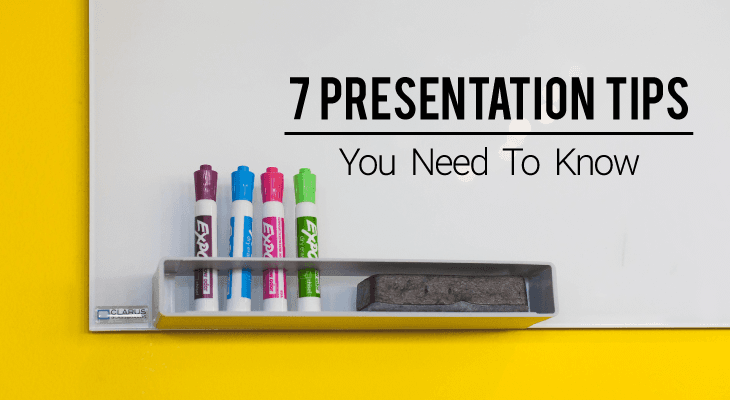Ace Your University Presentations With These 7 Tips
Giving a presentation in a classroom full of bored young adults can be a daunting ordeal. Find out how you can up your university presentations game with these 7 simple steps.
Updated 13 Jun 2019

If you loathe speaking in front a large group of people, then university life can bring upon a new set of worry — giving presentations.
Whether you’re addressing a large group of audience in a lecture hall or something smaller such as your tutorial class, there’s no doubt that public speaking can bring about a heightened sense of anxiety.
So how can you calm those nerves and ace your presentation? Here are 7 tips to help you.
#1. Understand your topic

Content is key to any presentation — you can’t deliver a stellar presentation without first understanding your subject matter. So before you fire up Microsoft PowerPoint and start typing away, ensure that you have read and understood any facts and data related to your presentation topic before nailing down the key information.
Understanding your topic will also help you sequence your points in a logical manner (e.g. introduction, body and conclusion), so that your lecturer and classmates can follow your presentation with ease.
Not only that, by sectioning your key points and tackling each point, you’ll be more organised and less frenzied when it comes to preparing your presentation slides.
#2. Figure out the number of slides you need

If you’ve groaned at the sight of the 87 slides your lecturer has put together for a 1-hour lecture, you’ll probably get the same reaction from your classmates if you have a large number of slides.
But how many is too many?
A simple rule of thumb is to have 1 slide for every 2 minutes of presentation. So, if your presentation is meant to last 20 minutes, you should aim to create about 10 slides. Too many and you’ll risk having to speed through the slides; too few and you may end up rambling.

#3. Avoid text-heavy slides

One of the biggest sins you can commit in presentations is copying and pasting your speech into the slides. Instead, your points should only include keywords to jog your memory (and not act as a comprehensive stack of notes!) so that your classmates will focus on you and not read off the slides.
So type out your points in bullet points, keeping it to an average of 5 bullet points per slide using simple language (i.e. little to no jargons). Not only is it easier on the eyes for your audience, it keeps you from reading directly from the slides too.
Remember that in this case, less is more.
PRO TIP
Jot down important notes on index or cue cards that you can hold on to during your presentation if you’re not confident of remembering your presentation speech.
Apply for university with EduAdvisor
Secure scholarships and more when you apply to any of our 100+ partner universities.
Start now#4. Include visual aids to keep it engaging

To avoid boring, all-white presentation slides, consider adding visual aids to support or reinforce your key points. If you are presenting a particularly factual topic, you can present your findings in the form of infographics, charts or videos instead of relying purely on text. After all, no one wants to sit through a wordy presentation!
While memes, animations and GIFs are entertaining, it shouldn’t overshadow or deviate from your key points as you stand to lose your audience’s attention. This also means that you should limit the use of transitions in your presentation as they may be distracting.
#5. Interact with your audience

It’s difficult to hold the attention of an audience — which is why it’s important to interact with them or risk seeing a sea of droopy eyes and heads bobbing up and down.
You can do this with humour (e.g. cracking a joke or two at the expense of a good friend in class), asking the audience a question (e.g. how much do they know about your presentation topic), or even sharing an amusing story that your classmates may be able to relate to.
Don’t forget to maintain eye contact with your audience too as it will make them feel involved with your presentation.

6. Dress to impress

Once you’ve nailed your content and delivery, your next step is to ensure that you have also dressed the part, especially if your lecturer has secretly allocated marks for a suit-and-tie combo.
So wear something that makes you look and feel good as it can give you a confidence boost — after all, when you feel good about yourself, your actions will reflect how you feel inside!
You should also practise giving your presentation in the clothes you’ll be wearing a day before to ensure it fits well — you want to be physically comfortable and ensure that you can move freely and comfortably.
PRO TIP
When an important event is around the corner, plan your outfits ahead of time so that you’ll have one less thing on your to-do list.
#7. And finally, practise, practise, practise!

We’ve all heard the popular saying “practice makes perfect” — and it's for good reason! Practising in front of a group of people will allow you to see how the audience react to your presentation, thus allowing you to make adjustments for the real deal.
Here’s how you can apply it to your presentation: rehearse in front of the mirror (or you can even record yourself with your phone), taking mental notes and experimenting with different things such as the flow of sentences, body language and intonation. Most importantly, time yourself to make sure that the presentation isn't too lengthy.
When you're ready, you can give a mock presentation in front of a small group of friends or family. Listen to their feedback and modify your presentation accordingly.
Presenting in front of your lecturers and classmates can be a traumatising experience. However, we hope that these tips can better prepare you for your next public speaking outing. So go out there and deliver a masterful presentation!






